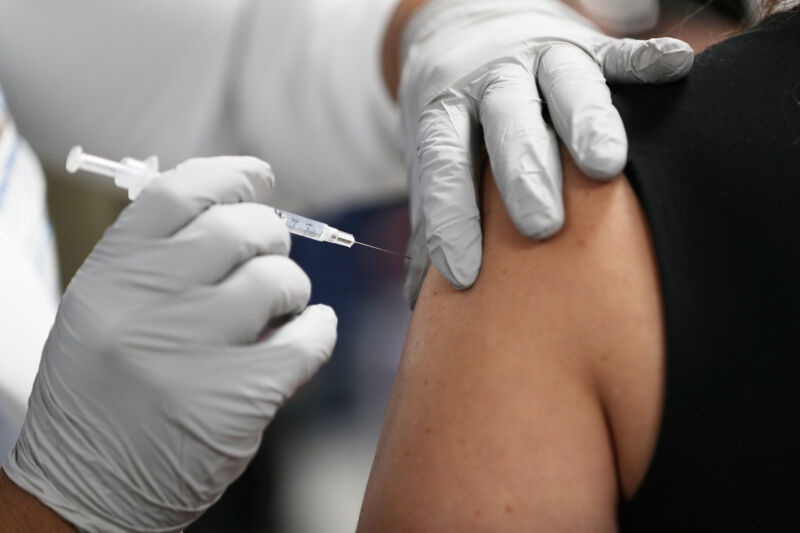Students’ plea to block Indiana U. vaccine mandate rejected by Justice Barrett
Students’ plea to block Indiana U. vaccine mandate rejected by Justice Barrett
College vaccine rule survives first SCOTUS test of a COVID vaccine mandate.

Getty Images | Joe Raedle
Supreme Court Justice Amy Coney Barrett yesterday rejected a request to block Indiana University's requirement that students be vaccinated against COVID-19.
"The case, Klaassen v. Trustees of Indiana University, was the first test of COVID-19 vaccine requirements to arrive at the Supreme Court," SCOTUSblog wrote. "The rule at the center of the case, announced in May by the university, requires all faculty, students, and staff to be vaccinated unless they qualify for a medical or religious exemption. Eight students went to federal court to challenge the constitutionality of the mandate, but on July 18 a federal district judge in Indiana rejected their request to block the mandate, and the US Court of Appeals for the 7th Circuit declined to put the mandate on hold while the litigation continues."
Students challenging the mandate asked for an emergency injunction that would block it, but the docket says that the application was "denied by Justice Barrett." Students claimed they have "a constitutional right to bodily integrity, autonomy, and of medical treatment choice in the context of a vaccination mandate" and that the university "is treating its students as children who cannot be trusted to make mature decisions." Barrett "rejected the plea without even asking the university for a response or getting her colleagues to weigh in," the Associated Press wrote.
Fight against mandate has low likelihood of success
The students' request for an emergency injunction came in the form an application to an individual justice. "Justices often act on their own in such situations when the legal question isn't particularly close. Barrett handles emergency matters from the US Court of Appeals for the 7th Circuit, which includes Indiana," the AP noted.
The denial doesn't necessarily prevent the students from filing a petition for certiorari that asks the full court to take up the case. A request for emergency action to one justice and a petition for certiorari to the entire court can be filed simultaneously.
To win an emergency order from a justice, a petitioner must show "that there is a 'reasonable probability' that four justices will grant certiorari, or agree to review the merits of the case; that there is a 'fair prospect' that a majority of the court will conclude upon review that the decision [by a lower court] on the merits was erroneous; [and] that irreparable harm will result from the denial of the stay," the Supreme Court says in a document explaining the procedure. Barrett's outright dismissal of the Indiana students' application suggests that they don't have much of a case.
"If a justice acts alone to deny an application, a petitioner may renew the application to any other justice of his or her choice, and theoretically can continue until a majority of the court has denied the application. In practice, renewed applications usually are referred to the full court to avoid such a prolonged procedure," the court says. If a justice grants an application, "the other side may file a motion to the full court to vacate that justice's stay. As a practical matter, these are rarely, if ever, granted."
No “fundamental right” to avoid vaccines
The appeals court ruling that denied the students' request on August 2 cited Jacobson v. Massachusetts, a 1905 case in which the Supreme Court backed a state vaccination law.
"Given Jacobson v. Massachusetts, which holds that a state may require all members of the public to be vaccinated against smallpox, there can't be a constitutional problem with vaccination against SARS-CoV-2," said the decision by a three-judge panel at the appeals court. The plaintiffs also made a due-process argument, but multiple court decisions show that "such an argument depends on the existence of a fundamental right ingrained in the American legal tradition," the ruling said. "Yet Jacobson, which sustained a criminal conviction for refusing to be vaccinated, shows that plaintiffs lack such a right. To the contrary, vaccination requirements, like other public-health measures, have been common in this nation."
Moreover, "this case is easier than Jacobson for [Indiana] University" because the school "has exceptions for persons who declare vaccination incompatible with their religious beliefs and persons for whom vaccination is medically contraindicated... Indeed, six of the eight plaintiffs have claimed the religious exception, and a seventh is eligible for it. These plaintiffs just need to wear masks and be tested, requirements that are not constitutionally problematic."
Another point in Indiana University's favor is that it simply made the vaccination a condition of attending the school, judges wrote. The Massachusetts law that was upheld in the century-old case had to meet a higher standard because it required every adult member of the public to be vaccinated. "People who do not want to be vaccinated may go elsewhere," the appeals court justices noted. "Many universities require vaccination against SARS-CoV-2, but many others do not. Plaintiffs have ample educational opportunities."
MMW


Comments
Post a Comment